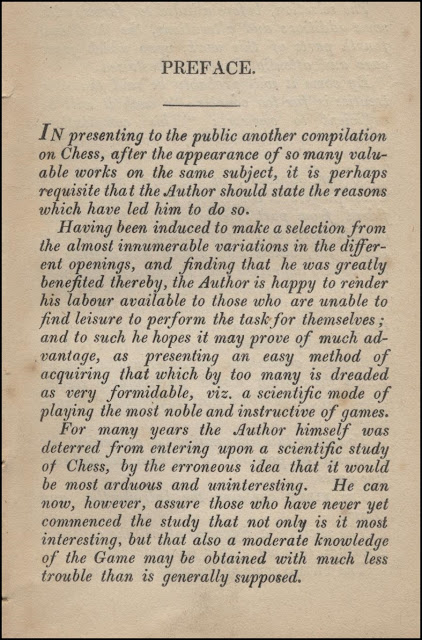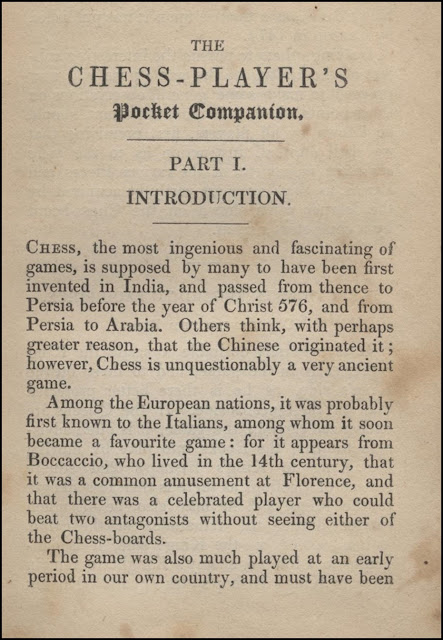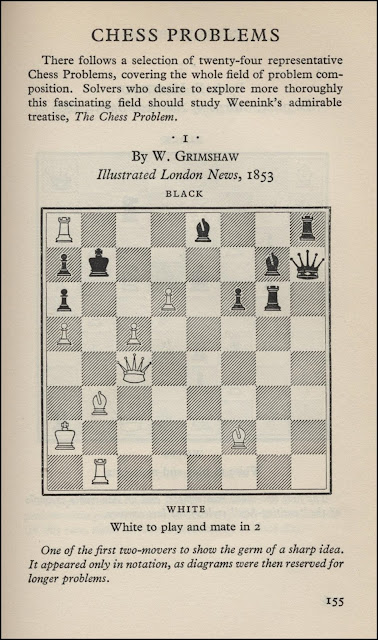There are 248 chess books recorded in Betts' Bibliography published before 1900, excluding periodicals; but here are a few others that are not recorded by Betts.
A Collection of Problems in Chess, by the most Eminent Composers; Exemplifying some of the greatest beauties of Chess Strategy, by John Augustus Miles, Fakenham 1855. 64 unnumbered leaves.
John Keeble refers to this work in his obituary of Miles in The British Chess Magazine, September 1891 page 422, commenting as follows: "In 1855 he commenced authorship, and published a small volume of selected problems, entitled Chess Strategy, which contained only 120 problems, without solutions, and is very little known, only fifty copies being printed. This was followed by Chess Gems in 1860, and in 1878 another edition of the latter was issued, greatly enlarged, and considered at the time to be the best work of its kind extant."
The List of Subscribers includes only thirteen names, taking twenty copies between them.
 | |
| BCM September 1891 opposite page 421 |
The List of Subscribers includes only thirteen names, taking twenty copies between them.
The book includes 120 problems (plus two in the frontis) printed two to a page on the rectos only. These include problems and endgame studies by Kling, Anderssen, Bolton, Horwitz and many others. Problem no. 120 has been replaced by another pasted over the top.
The National Library of the Netherlands and the Cleveland Public Library both have this book as do several other libraries. This is also in the 1955 van der Linde-Niemeijeriana catalogue (LN 2395) which was a primary source for Betts, so it is surprising that he missed this. A copy was also included in Quaritch's 1929 catalogue of Rimington Wilson books, no. 983.
How to Play Chess, by G. C. Heywood, Newcastle-on-Tyne 1893.
The content of this basic primer of 37 pages was taken from the Newcastle Weekly Chronicle for which Heywood edited the chess column from 1890 up to his death in 1895, when the column was continued by his wife.
The content of this basic primer of 37 pages was taken from the Newcastle Weekly Chronicle for which Heywood edited the chess column from 1890 up to his death in 1895, when the column was continued by his wife.
 | |
| BCM December 1893 opposite page 507 |
The Elementary Lessons in Chess consisted of: Lesson I, The Chess Board, Lesson II, The Pieces, Lesson III, Notation, and Lesson IV, Technical Terms. These are followed by one illustrative game, with no details of players or place, and 20 Minor or Special Principles by W. N. Potter, editor of the City of London Chess Magazine from 1875 to 1876, and with whom Heywood played two matches receiving the odds of pawn and two moves while they were both members of the City of London Chess Club.
The final page includes recommendations for further study:
This is a very scarce item with no copies recorded in the British Library, National Library of the Netherlands or the Cleveland Public Library. However the Harvard College Library, which has substantial chess holdings, has a copy.
Report of the second annual Gathering of the Northumberland and Durham Chess Association, held at North Shields, on Easter Monday and Tuesday, 22nd & 23rd April 1867, Newcastle-upon-Tyne 1868. 57, [1] pages plus adverts.
This was a relatively minor tournament for local players but resulted in the publication of a very attractive tournament book giving full details of the event.
The List of Members includes Honorary Members headed by Howard Staunton.
Several tournaments were organised, according to the number of players who turned up on the day, including the main tournament which was open to all amateurs (won by D. Hill), a handicap tournament and some lesser events. A limitation of time was established but obviously chess clocks had not yet been invented. A Problem Tournament ran alongside the event with P. T. Duffy and H. C. Mott as examiners. All prizes were given in the form of chess literature and equipment.
The book includes 34 games and 12 problems.
It is evident that chess tournaments of 150 years ago were rather formal occasions compared to today's generally more casual events, although I recently attended the opening ceremony of the Dutch Chess Championships which included several speeches, a classical music recital and formal introductions of all sixteen players.
This particular copy is from J. W. Rimington Wilson's library having been acquired from Lowenthal's chess library, and has Rimington Wilson's usual "ent in cat" inscription. This is no. 1043 in Bernard Quaritch's 1929 catalogue of Rimington Wilson books. Lowenthal's chess library was sold at auction by Puttick and Simpson on 8th - 10th November 1876, see Aucta 701.
Another rare item, I can find no record of this book in any online library. There was also a Report of the first annual Gathering of the Northumberland and Durham Chess Association; no. 1042 in the aforementioned Quaritch catalogue, but not recorded in Betts.
It seems that books published outside of London, and especially in Newcastle, were the most likely to have been omitted by Betts, and here is another one:
The Principles of Chess: A Lecture delivered before the Newcastle-upon-Tyne Chess Club, by Louis Zollner, on Tuesday, 10th March, 1891. Newcastle-upon-Tyne 1891. LN 1077. In KB, CPL and Harvard.
Origin and Early History of Chess, by A. A. Macdonell, London 1898.
This is LN 244, Aucta 712, and is in KB and CPL.
Professor Arthur Anthony Macdonnell was an eminent Sanskrit scholar and this 25 page booklet consists of an article extracted from the Journal of the Royal Asiatic Society for January 1898.
The essay is an extremely erudite discourse on the subject, with many references to Sanskrit literature, and Macdonnell's writings are frequently quoted in Murray's History of Chess. Interestingly, Macdonnell quotes Murray's English Dictionary in his discussion of the various meanings of the word "check". This is Sir James Murray, father of H. J. R. Murray and chief editor of the Oxford English Dictionary.
Macdonell concludes that chess was known in India in the sixth century before spreading to Persia, Arabia and Europe in that order.
My copy of this item is inscribed to Professor Jacobi, the German Sanskrit scholar and mathematician, who is mentioned several times in this booklet, but he had obviously not read this as the gatherings were unopened.
The Chess-Player's Pocket Companion, by Samuel Comyn, London 1851. vii, 68 pages with folding plate of a chess-board between pages 20 and 21.
This is primarily a book on the openings but also includes an Introduction which covers the history of chess (Comyn states in a few words the conclusions of Macdonell written nearly fifty years later), general instructions, maxims, laws, notation etc. The final chapter discusses various endings.
This book is not in the KB online catalogue but is in the British Library and Cleveland Public Library, and the Harvard University copy has been digitised.
 | |
| Folding plate from Comyn's Chess Player's Pocket Companion |
I would like to thank Owen and Kathleen Hindle for considerable help in composing this article and especially for access to the first three books detailed above.
© Michael Clapham






































